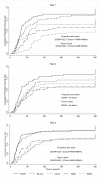Critical design elements of e-health applications for users with severe mental illness: singular focus, simple architecture, prominent contents, explicit navigation, and inclusive hyperlinks
- PMID: 24375458
- PMCID: PMC4332933
- DOI: 10.1093/schbul/sbt194
Critical design elements of e-health applications for users with severe mental illness: singular focus, simple architecture, prominent contents, explicit navigation, and inclusive hyperlinks
Abstract
Objective: E-health applications are becoming integral components of general medical care delivery models and emerging for mental health care. Few exist for treatment of those with severe mental illness (SMI). In part, this is due to a lack of models to design such technologies for persons with cognitive impairments and lower technology experience. This study evaluated the effectiveness of an e-health design model for persons with SMI termed the Flat Explicit Design Model (FEDM).
Methods: Persons with schizophrenia (n = 38) performed tasks to evaluate the effectiveness of 5 Web site designs: 4 were prominent public Web sites, and 1 was designed according to the FEDM. Linear mixed-effects regression models were used to examine differences in usability between the Web sites. Omnibus tests of between-site differences were conducted, followed by post hoc pairwise comparisons of means to examine specific Web site differences when omnibus tests reached statistical significance.
Results: The Web site designed using the FEDM required less time to find information, had a higher success rate, and was rated easier to use and less frustrating than the other Web sites. The home page design of one of the other Web sites provided the best indication to users about a Web site's contents. The results are consistent with and were used to expand the FEDM.
Conclusions: The FEDM provides evidence-based guidelines to design e-health applications for person with SMI, including: minimize an application's layers or hierarchy, use explicit text, employ navigational memory aids, group hyperlinks in 1 area, and minimize the number of disparate subjects an application addresses.
Keywords: Web site; Web site design; Web site usability; e-mental health; schizophrenia.
© The Author 2013. Published by Oxford University Press on behalf of the Maryland Psychiatric Research Center. All rights reserved. For permissions, please email: journals.permissions@oup.com.
References
-
- Brattberg G. Internet-based rehabilitation for individuals with chronic pain and burnout II: a long-term follow-up. Int J Soc Psychiatry. 2011;30:231–234. - PubMed
-
- Cavanagh K, Shapiro DA, Van Den Berg S, Swain S, Barkham M, Proudfoot J. The effectiveness of computerized cognitive behavioural therapy in routine care. Br J Clin Psychol. 2006;45:499–514. - PubMed
Publication types
MeSH terms
Grants and funding
LinkOut - more resources
Full Text Sources
Other Literature Sources
Medical


